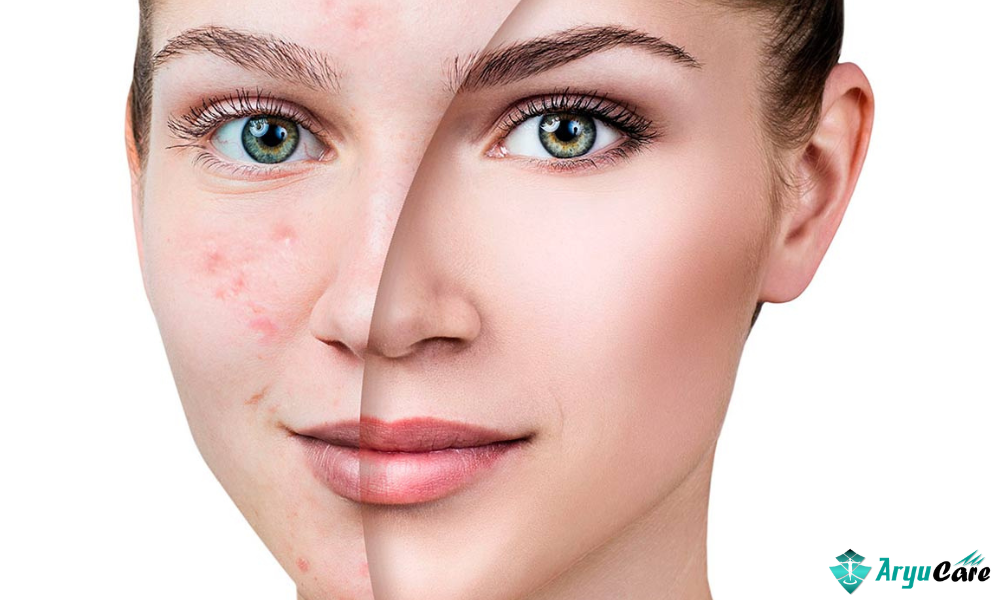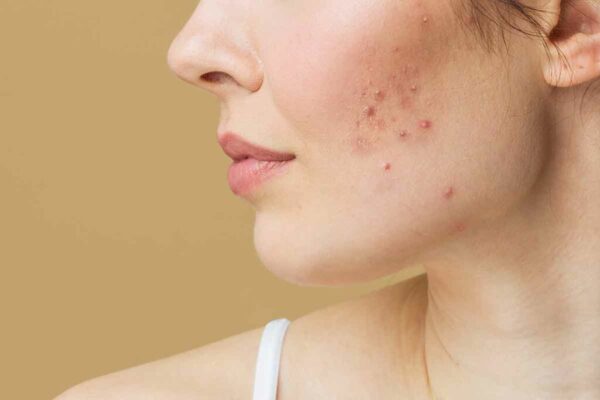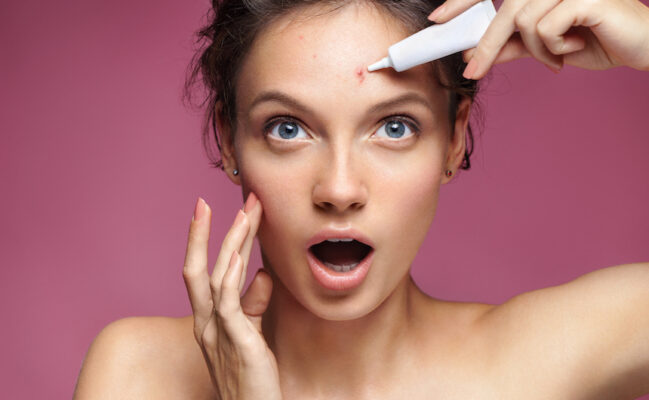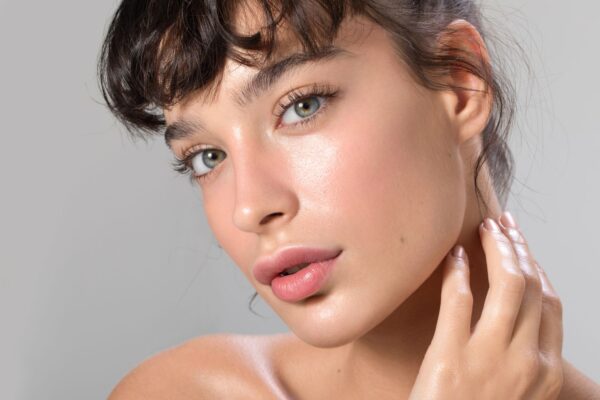Acne
What Are the Main Factors that Cause Acne?
The root cause lies in the hair follicles being clogged with oil and dead skin cells. This leads to the formation of unsightly blemishes. To effectively manage acne, it’s important to understand its different types. These include hormonal acne, cystic acne, and comedonal acne. Each type requires a specific approach for treatment.
Acne is a common skin issue. It mostly happens during adolescence and can continue into adulthood. Acne is a common skin problem. It causes pimples, blackheads, whiteheads, and sometimes cysts in severe cases. Acne doesn’t just affect your skin. It can also impact your self-esteem and emotions.
Causes of Acne
Acne is mainly caused by too much sebum, an oily substance made by glands in the skin. Excess oil can mix with dead skin cells and block hair follicles. This can lead to more acne-causing bacteria growing in the skin. During puberty, menstruation, and pregnancy, hormonal changes can lead to higher sebum production. This makes these time periods more likely to cause acne breakouts. Genes, some medications, and pollution can also cause acne.
Types of Acne
Acne manifests in various forms, ranging from mild to severe. Common types include: .
Blackheads and Whiteheads: Non-inflammatory lesions caused by clogged pores. Blackheads are open and look dark because of oxidation. Whiteheads stay closed.
Papules and Pustules: Inflammatory lesions resulting from the rupture of the follicular wall. Papules are red, small bumps. Pustules have pus and are often called pimples.
Nodules and Cysts: Severe forms involving deeper skin layers. Nodules are tough and hurt, while cysts are fluid-filled sacs that can cause scars.
What Does Acne Look Like?
Recognizing acne is the first step towards its control. Acne can come in different forms, such as small red pimples or larger cysts. Acne can be mild or severe, which affects the treatment needed. Understanding the visual cues helps in early identification and intervention.
Acne is a common skin condition that can manifest in various forms. The appearance of acne can vary depending on the type and severity of the lesions. Here are some common types of acne and their typical characteristics: .
Whiteheads are small, closed bumps that appear as white or flesh-colored on the skin. They form when hair follicles are blocked with oil and dead skin cells. They occur when hair follicles are blocked with oil and dead skin cells.
Blackheads are open pores that look dark because of oil and dead skin cells. They can be slightly raised and appear black or dark brown. They are slightly raised and often appear black or dark brown.
Papules
Small, red bumps that may be tender to the touch. These result from inflammation and infection of the hair follicles.
Pustules
Similar to papules but with a white or yellowish center caused by pus. Pustules are often filled with a mixture of white blood cells, dead skin cells, and bacteria.
Nodules
Large, painful, solid lumps beneath the surface of the skin. Nodules develop deep within the hair follicles and can be a more severe and inflamed form of acne.
Cysts: Deep, pus-filled lesions that are larger and more severe than nodules. Cysts can be painful and may lead to scarring.
Acne Is Usually Preventable And Easily Treatable
Contrary to popular belief, acne is not an unstoppable force. It is often preventable and easily treatable with a consistent skincare routine. Regular cleansing, avoiding excessive makeup, and a healthy diet reduce acne flare-ups. It’s simple but effective.
Acne is common, but you can often prevent it and it usually responds well to treatments. Here are some general tips for preventing and treating acne: .
Prevention
Clean your skin regularly using a gentle cleanser to get rid of extra oil, dirt, and dead skin cells. Avoid scrubbing too hard, as it can make your skin irritated. Avoid harsh scrubbing, as it can irritate the skin.
Hydration
Stay well-hydrated by drinking enough water to help maintain healthy skin.
Don’t touch your face with dirty hands. It can spread bacteria and cause acne. Avoid picking or popping pimples. This can cause scarring and make inflammation worse.
Eat a balanced diet with fruits, veggies, whole grains, and lean proteins. It’s important. Studies suggest a diet-acne link. Individual responses may vary.
To prevent acne, stay away from things that can make it worse. These include certain skincare items, too much sun, and changes in hormones.
Mistakes to Avoid – Acne
In our quest for clear skin, certain common mistakes can exacerbate acne. Washing your face too often, using rough scrubs, or picking at pimples can make acne worse. Understanding these pitfalls is crucial for steering clear of counterproductive habits.
Overwashing can strip the skin of its natural oils. This could worsen acne. Stick to a gentle cleansing routine.
Avoid picking, squeezing, or popping pimples. Doing so can cause scars, spread bacteria, and make inflammation worse.
Avoid harsh skincare products. They can irritate the skin and make acne worse. Instead, choose gentle, non-clogging products. Opt for gentle, non-comedogenic products.
Don’t skip moisturizer, even if your skin is oily. Use a non-comedogenic moisturizer to keep your skin hydrated. Dehydrated skin can trigger increased oil production.
Ignoring sun protection worsens hyperpigmentation. Sun exposure can lead to more noticeable scarring. Always use a broad-spectrum sunscreen with at least SPF 30.
Inconsistent Routine: Consistency is key when it comes to skincare. Stick to a regular routine and give products time to work before expecting results.
Using too many products can be bad for your skin. Stick to a simple routine and slowly try new products to see how they affect your skin. Stick to a basic routine. Introduce new products slowly to see how they work.
If over-the-counter products aren’t working, it’s a good idea to see a dermatologist. They can give you effective treatments that are tailored to your needs. They can prescribe effective treatments based on your specific needs.
Not paying attention to what you eat and how you live can affect your skin. Eating a balanced diet and leading a healthy lifestyle can help keep your skin healthy. Some people may find a link between certain foods and acne.
Stress Neglect: Chronic stress can contribute to acne flare-ups. Practice stress management techniques, such as exercise, meditation, or deep breathing.
How can I remove acne?
Struggling with acne? There’s hope in effective ways to remove it. Topical treatments with benzoyl peroxide or salicylic acid can help. But remember Topical treatments containing benzoyl peroxide or salicylic acid can be instrumental. However, consistency is key, as results may take time to manifest.
Gentle Cleansing
Use a mild, non-comedogenic cleanser to wash your face twice daily. Avoid harsh scrubbing, as it can irritate the skin and worsen acne.
Topical Treatments
Benzoyl Peroxide can help with acne by reducing bacteria and clearing pores. Salicylic Acid exfoliates skin, removing dead cells and preventing clogged pores. Retinoids in prescription creams or gels help renew skin and prevent new breakouts.
Even if your skin is oily, use a non-clogging moisturizer to keep it hydrated. Dehydrated skin may produce more oil, exacerbating acne.
Protect your skin from sun damage by using sunscreen with SPF 30 or higher. Some acne treatments can make your skin more sensitive to sunlight. Some acne medications can increase sensitivity to sunlight.
Don’t pick, squeeze, or pop pimples. It can cause scars and more swelling.
A healthy diet is important for maintaining clear skin. Eating fruits, vegetables, and whole grains can help improve your overall skin health. The relationship between diet and acne is complicated and differs for each person.
Keep your skin healthy and your body hydrated by drinking plenty of water. It helps maintain overall health and keeps your skin moisturized.
Regular exercise can improve blood circulation. It can also reduce stress and promote clearer skin.
Manage stress by doing activities like meditation, deep breathing, or yoga. Stress can make acne worse.
Consult a Dermatologist if over-the-counter products aren’t effective. Seek professional advice for severe or persistent acne. They can recommend prescription medications or procedures tailored to your specific needs.
FAQ
What causes acne?
Acne is primarily caused by the overproduction of oil, clogged hair follicles, bacteria, and inflammation. Hormonal changes, genetics, and certain medications can also contribute.
How can I prevent acne breakouts?
Preventive measures include regular cleansing with a mild, non-comedogenic cleanser, avoiding harsh scrubbing, using oil-free products, and maintaining a healthy lifestyle with a balanced diet and hydration.
Are there specific foods that cause acne?
The relationship between diet and acne is complex and varies among individuals. While there’s no conclusive evidence linking specific foods to acne, some people may find that certain dietary factors influence their skin.
What over-the-counter products are effective for treating acne?
Over-the-counter products containing benzoyl peroxide, salicylic acid, or alpha hydroxy acids can be effective in treating mild to moderate acne. It’s important to choose products suitable for your skin type.
How can I get rid of acne scars?
Treatment options for acne scars include topical treatments like retinoids, chemical peels, microdermabrasion, laser therapy, and dermal fillers. Consultation with a dermatologist is recommended for personalized advice.
Is it okay to pop pimples?
Popping pimples is generally discouraged as it can lead to scarring, infection, and prolonged healing. It’s better to use targeted treatments and avoid picking at the skin.
How long does it take for acne treatments to show results?
The timeframe for seeing results varies. Over-the-counter products may show improvement in a few weeks, while prescription medications may take longer. Consistency is key, and individual responses differ.
Can stress cause acne?
Stress can contribute to acne flare-ups by triggering hormonal changes that increase oil production. Managing stress through relaxation techniques and lifestyle adjustments may help.
Are there effective natural remedies for acne?
Some natural remedies, such as tea tree oil, aloe vera, and green tea, may have anti-inflammatory or antibacterial properties. However, their effectiveness can vary, and it’s essential to consult with a dermatologist for guidance.
When should I see a dermatologist for acne?
Consider consulting a dermatologist if over-the-counter products are not working, if you have severe or persistent acne, or if you experience significant emotional distress due to your skin condition. Dermatologists can provide tailored treatment plans and prescribe stronger medications if needed.
Trending Product
ERYTOP Gel 20gm | PERSOL 2.5% Gel 20gm | SUPATRET 0.10% Gel 20gm | tretinoin Microsphere Gel 20gm 0.04 – Aryu Care | Tretiva 5 Mg






This article has inspired me to be more proactive about my skincare routine. I never realized how many factors contribute to acne, but now I feel better equipped to tackle it head-on. Thanks for the informative read!
This article is super informative! I always thought acne was just about oily skin, but now I see there are so many factors at play. Thanks for sharing!
I found it interesting to learn about the role of hormones in acne development. It’s frustrating how hormonal fluctuations can wreak havoc on our skin, but it’s reassuring to know there are ways to manage it.
This article provided a great overview of the main factors that contribute to acne, but I’m left wondering about treatment options.
This article covers some important factors contributing to acne, but I’d love to see more about how stress affects our skin. Stress seems like a big player in breakouts for many people!
Hormonal changes seem inevitable, but it’s helpful to understand how they contribute to acne. Any advice for managing hormonal acne?
Acne is mainly caused by factors such as excess oil production, clogged pores, bacteria, inflammation, hormonal changes, genetics, certain medications, diet, and stress.
It would be helpful to include some DIY remedies for acne in future articles. Many people are interested in natural solutions for skincare.
Wow, this article really breaks down the causes of acne! I never knew stress could play such a big role. Can you suggest some effective stress-relief techniques to prevent breakouts?
This article nailed it! Understanding the main factors that cause acne is key to managing it effectively. Thanks for breaking it down in such an informative way!
Interesting read on the main factors that cause acne! It’s helpful to understand the different factors that can contribute to acne breakouts. Your explanation was really informative. Looking forward to more articles like this!
As someone who struggles with acne, I found the skincare tips section super helpful! It’s easy to get overwhelmed by all the products out there, so having some guidance on what to look for is invaluable.
Wow, never thought pollution could contribute to acne! Time to cleanse better.
Wow, never thought pollution could contribute to acne! Time to cleanse better.
Weather conditions contributing to acne—interesting read! Time to adjust my skincare routine.
Hey there! Great article on acne causes. Stress is definitely a big one for me—I can always tell when exams are coming up because my skin freaks out! Thanks for breaking down the science behind it all.
Great article on acne causes. It’s so true that stress plays a huge role—I’ve definitely noticed breakouts during crunch times at work. And who knew about genetics? Thanks for breaking it down!
Acne, the uninvited guest in our skincare routine! Show it the door with patience and a good skincare regimen. 🚪💆♀️ #SkinCareGoals
Meet the acne squad: oil, dead skin cells, and bacteria – the ultimate party crashers on your face!
Let’s talk acne factors – diet, meet your nemesis: greasy foods. They’re like oil spills on your skin’s pristine beach.